How often I’ve heard friends respond to my offer of nuts by saying, “Oh, no thank you, they’re too fattening.” In other instances, people who simply cannot stop eating them tell me, “I know nuts are bad for me, but I just love ‘em.” Many people are convinced that nuts are unhealthful because they are high in fat. What they fail to realize is the fats contained in nuts are actually beneficial.
Along with their healthful mono- and polyunsaturated fats, nuts are a storehouse of vitamins, minerals, and phytochemicals that aid in lowering cholesterol and reducing the risk of heart attack. Nuts offer other benefits because they are a source of plant sterols, indoles, phenolic compounds, and bioflavonoids that have been shown to prevent some cancers.
Bolstering the case for including nuts in the diet, the United States Food and Drug Administration released a report in July 2003 giving nuts the thumbs up. They announced product labels could now make health claims that consuming 1.5 ounces of nuts a day as part of a diet low in saturated fat and cholesterol was beneficial in reducing the risk of cardiovascular disease.
Nuts are a Treasure Trove of Nutritious Properties
Too often people are so focused on the fat content of nuts they ignore other data listed on nutrition panels. For instance, the labeling confirms that nuts are a very low-sodium food and they contain no cholesterol. Nuts are an excellent source of plant protein and dietary fiber. One ounce of raw almonds provides 6 grams of protein plus 3 grams of fiber. That same quantity of raw peanuts provides 7 grams of protein and 2 grams of dietary fiber. Yet these amazing figures are pushed out of focus while attention is given to the high fat content of nuts, often made unhealthful by the addition of oils and salt “to make them taste better.” In addition, this exceptional food contains a host of beneficial nutrients not listed on food labels, like vitamins, minerals, and phytochemicals. In their simple, natural state, nuts are a nutrient-dense food that has rich, satisfying flavor without the need for alteration or enhancement.
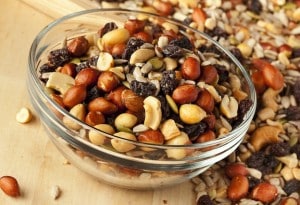 Even though all nuts have some nutritional components in common, each variety has some unique properties. Chestnuts, for example, are the only nuts that contain a measurable quantity of vitamin C. One ounce of boiled chestnuts contains 7.6 mgs. of vitamin C, while most other nuts contain none.
Even though all nuts have some nutritional components in common, each variety has some unique properties. Chestnuts, for example, are the only nuts that contain a measurable quantity of vitamin C. One ounce of boiled chestnuts contains 7.6 mgs. of vitamin C, while most other nuts contain none.
All nuts contain calcium, but almonds stand apart with 248 mg for 3.5 ounces. With 17.3 mg of copper for 3.5 ounces, hazelnuts are recognized for their high level of this mineral, which contributes to bone health and keeps blood vessels functioning optimally.
Iron and zinc, two minerals present only in small quantities in a plant-based diet, can be found in nuts. Cashews and pecans boast ample supplies of zinc, with 5.6 mg and 4.5 mg respectively for 3.5 ounces. One of the many important functions of zinc is its contribution to our sensory ability to taste.
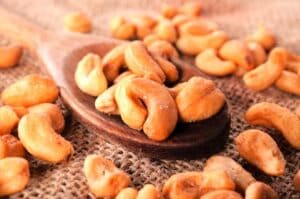 Cashews contain exceptional quantities of iron, a mineral vital to the production of hemoglobin. Brazil nuts are the champions of selenium, an important antioxidant and detoxifier, while pistachios, chestnuts, and almonds contain a storehouse of potassium, which plays a major role in the regulation of our heartbeat.
Cashews contain exceptional quantities of iron, a mineral vital to the production of hemoglobin. Brazil nuts are the champions of selenium, an important antioxidant and detoxifier, while pistachios, chestnuts, and almonds contain a storehouse of potassium, which plays a major role in the regulation of our heartbeat.
Every variety of nuts offers fiber, but pistachios and almonds are at the top of the list. Credit almonds and filberts for their high content of vitamin E, an antiaging protector against free radical damage to our cells. Ranking just below beans, berries, artichokes, and apples, pecans offer the highest number of antioxidants in the nut family. Each variety of nut contains arginine, the amino acid that aids in forming nitric oxide to keep the blood vessels pliable for good blood flow. Peanuts and almonds supply us with the greatest quantity of arginine.
Nuts are exemplary citizens of the plant world and deserve a place on the daily breakfast, lunch, or dinner plate. Because data from recent studies unveiled the merit of nuts, health professionals now agree that a small daily serving of 1.5 ounces of nuts may reduce the risk of heart attack.
Put Oil-Roasted Nuts on the No-No List
Common sense tells us that nuts roasted in unhealthful oils and doused with salt are not a smart addition to anyone’s diet. First, the oil used in roasting may be partially hydrogenated, a process that changes the chemical structure of the oil, turning it into a dangerous trans-fatty acid. Hydrogenated and partially hydrogenated fats are two to four times more troublesome in the bloodstream than saturated fat. Because trans-fatty acids tend to raise LDL cholesterol (the bad guys) and lower HDL cholesterol (the good guys), they are a factor leading to serious coronary artery disease. Frequently nuts are roasted in partially hydrogenated oils, turning healthful raw nuts into a product that poses a health risk. Medical experts warn that hydrogenated fats and excessive amounts of saturated fats in the diet contribute to atherosclerosis, a buildup of plaque in the arteries that raises the risk of heart attack.
Second, roasting nuts in oil adds unneeded calories. Consider that one tablespoon of any oil contains about 120 calories and approximately 14 grams of fat.
The third problem to the unhealthful combination is the amount of salt one can consume in a handful or two of salted nuts. The accepted level of salt intake that nutritionists agree upon is about one teaspoon (2300 mg) per day. At social gatherings, guests may easily exceed this amount by unconsciously reaching for one handful of salted nuts after another.
Nuts Promote Weight Loss
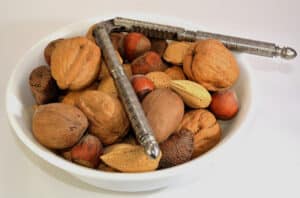 Because nuts are so full of nutrients, their fats, carbohydrates, and protein combine to bring rich, earthy flavor to the palate and provide a feeling of satiety when small amounts are added to the diet. Even the “little bit goes a long way” practice of consuming one or two ounces of nuts a day can promote weight loss when other dietary fats are reduced. Eaten in these small quantities, nuts can provide a healthful alternative to foods high in saturated fats and cholesterol such as meat, chicken, fish, eggs, and dairy products. Consider incorporating nuts into a salad, soup, vegetable stir-fry, or casserole with vegetables, legumes, and grains. You won’t lose anything but a few pounds.
Because nuts are so full of nutrients, their fats, carbohydrates, and protein combine to bring rich, earthy flavor to the palate and provide a feeling of satiety when small amounts are added to the diet. Even the “little bit goes a long way” practice of consuming one or two ounces of nuts a day can promote weight loss when other dietary fats are reduced. Eaten in these small quantities, nuts can provide a healthful alternative to foods high in saturated fats and cholesterol such as meat, chicken, fish, eggs, and dairy products. Consider incorporating nuts into a salad, soup, vegetable stir-fry, or casserole with vegetables, legumes, and grains. You won’t lose anything but a few pounds.
People used to eating fatty foods will find nuts an enjoyable substitute. Because nuts are high in mono- and polyunsaturated fats, yet low in saturated fat, dieters will find these small quantities of nuts a pleasurable replacement for their usual snack foods, such as potato or corn chips. It is important, however, that dieters’ total calorie consumption be taken into consideration. One cannot lose weight by simply adding another high-fat food to an already fatty diet.
Nuts Contain Good Fats
The monounsaturated fats in cashews, almonds, peanuts, hazelnuts, macadamias, pistachios, and pecans, and the polyunsaturated fats in walnuts, are shown in many studies to reduce LDL cholesterol, resulting in a lower risk of heart attack. Studies have found that nuts are helpful in preventing some types of cancers, while other studies report that nuts reduce the risk of type 2 diabetes.
Excerpted from The Nut Gourmet: Nourishing Nuts for Every Occasion*(Book Publishing Company) by Zel Allen. Zel, along with her husband Reuben, runs the popular monthly online zine Vegetarians in Paradise.
- For lots more features on healthy lifestyle, explore VegKitchen’s Healthy Vegan Kitchen page.
- Here are more of VegKitchen’s Natural Food Guides.
*This post contains affiliate links. If the product is purchased by linking through this review, VegKitchen receives a modest commission, which helps maintain our site and helps it to continue growing!


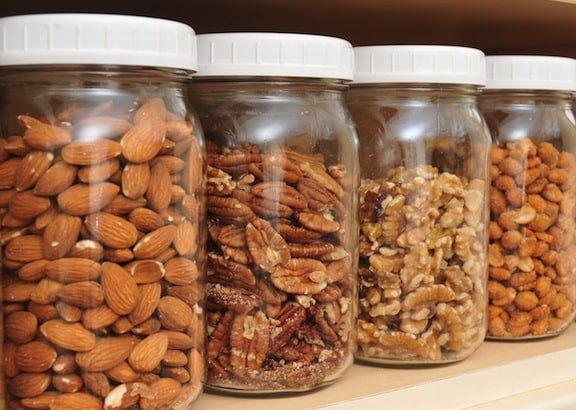
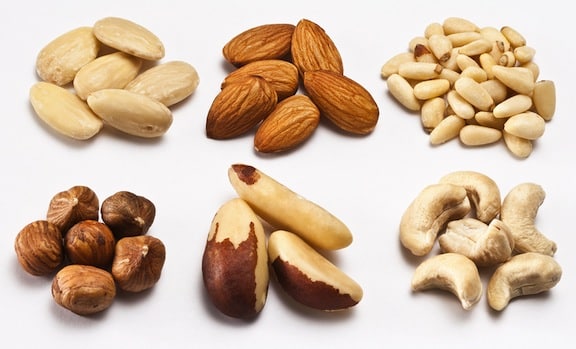
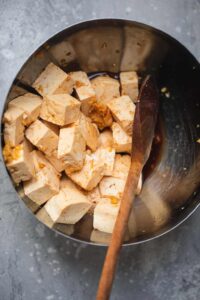



Irene @ H.E.S.H. says
Nuts are one of the most nutritious food there is. I learned that back in college and I have been incorporating it in our food once in awhile. I hope to see more of nut recipes next.